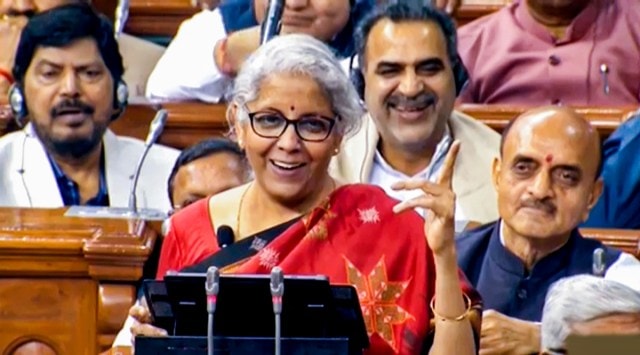As many as 50 destinations will be developed as ‘a complete package of tourism’, said Finance Minister Nirmala Sitharaman in her Budget speech. These destinations will be selected through challenge mode, using an integrated and innovative approach, she added. Officials tell the Indian Express that these destinations include both rural and urban locations across the country, even as the final list will be drawn up soon.
Going forward, for these selected 50 destinations, information on physical connectivity, virtual connectivity, tourist guides, food streets and tourist security and other relevant aspects of the visitor experience would be made available through an app.

In fact, destination management is among the five key features of the National Tourism Policy, besides green tourism, digital tourism, skilling of the hospitality sector and supporting tourism-related MSMEs, which is likely to be tabled in the Budget Session itself. Sustainable tourism practices and extensive use of digital interfaces will also be encouraged in the coming years, as per officials in the ministry.
Story continues below this ad
India also plans to leverage its ongoing G-20 presidency as an opportunity to push India as a preferred tourist destination. The 215 meetings are being held at 55 different locations covering most states, including places like Siliguri, Khajuraho, Hampi, Guwahati, Rann of Kutch and Ladakh. Some of these places are likely to make it to the list of 50 destinations mentioned in the Budget.
The country offers an immense attraction for domestic as well as foreign tourists, said Sitharaman. “There is a large potential to be tapped in tourism. The sector holds huge opportunities for jobs and entrepreneurship for youth in particular,” she remarked.
The focus of tourism development would be on domestic as well as foreign tourists, said Sitharaman, adding, “There is a large potential to be tapped in tourism. The sector holds huge opportunities for jobs and entrepreneurship for youth in particular.”
In keeping with that goal, the promotion of tourism will be taken up on mission mode, with the active participation of states, the convergence of government programmes, and public-private partnerships.
Story continues below this ad
In keeping with that goal, the promotion of tourism will be taken up on mission mode, with active participation of states, convergence of government programmes and public-private partnerships. Connectivity is likely to give a major boost to tourism. Fifty additional airports, heliports, water aerodromes and advance landing grounds will be revived for improving regional air connectivity, as per the Budget.
To give a fillip to domestic tourism, which has mostly sustained the sector after the pandemic, sector-specific skilling and entrepreneurship development will be dovetailed to achieve the objectives of the ‘Dekho Apna Desh’ initiative, launched in 2019 after an appeal by the Prime Minister to prefer domestic over international tourism.
To give a fillip to domestic tourism, which has mostly sustained the sector after the coronavirus pandemic, as international visitors are still back to pre-pandemic levels, sector-specific skilling and entrepreneurship development will be put together to achieve the objectives of the ‘Dekho Apna Desh’ initiative, which was launched in late 2019 after an appeal by the Prime Minister to prefer domestic tourism over international tourism.
In terms of allocation, the flagship Swadesh Darshan scheme gets Rs 1,412 crore, compared to Rs 600 crore in 2022-23. It is under the revamped Swadesh Darshan scheme that 50 destinations will be identified across 15 states to be promoted as part of India’s new tourism policy, focused on destination tourism. The Ministry’s other flagship scheme – Pilgrimage Rejuvenation and Spiritual, Heritage Augmentation Drive (PRASHAD) – gets Rs 250 crore, almost the same as 2022-23.
Story continues below this ad
From a strategic point of view, border tourism is being given huge importance. “To encourage tourism in the border villages, tourism infrastructure and amenities will be facilitated under the Vibrant Villages Programme,” announced the Finance Minister.
Besides, from a strategic point of view, border tourism is being given huge importance. “To encourage tourism in the border villages, tourism infrastructure and amenities will be facilitated under the Vibrant Villages Programme,” announced the finance minister.
The approach to tourism will also integrate with the art and craft sector. The Minister said Unity Mall, to promote and sell each state’s own One District, One Product (ODOPs), Geographical Indication (GI) and other handicraft products will be set up, in the state capitals or its most prominent tourism centre.
The approach to tourism will also integrate with the art and craft sector. Sitharaman said Unity Mall, to promote and sell each state’s own One District, One Product (ODOPs), Geographical Indication (GI), and other handicraft products will be set up. States will be encouraged to set up such Unity Mall in the capital city or most prominent tourism centre or the financial capital and also provide space for ODOPs & GI products of other states as well at these outlets.
Story continues below this ad
The industry has largely welcomed the importance tourism has been given at the opening of the FM’s Budget Speech, even as it has raised concerns over the increase in TCS (Tax Collection at Source) mandate on overseas tour packages.
Rajesh Magow, Co-Founder and Group CEO of MakeMyTrip, calls it a proposal that will negatively impact the industry. “The increase in TCS mandate from 5% to 20% on overseas tour packages will not only increase the upfront cash outflow for customers but will also give an unfair advantage to foreign-based online travel booking platforms over India-based travel agents and tour operators,” he says.
In fact, Rajiv Mehra, president of Indian Association of Tour Operators (IATO), which represents more than 1,400 tour operators, adds that “some of our members who do outbound tourism business will have to close their business, and the TCS mandate needs to be rolled back immediately”.
”Also, none of our demands such as rationalisation of GST on the tourism industry, exemption of GST on foreign exchange earnings and refund of tax on shopping under tax refund to tourist scheme on shopping, have been considered,” said Mehra.
Union Budget 2023: All you need to know
Story continues below this ad

































